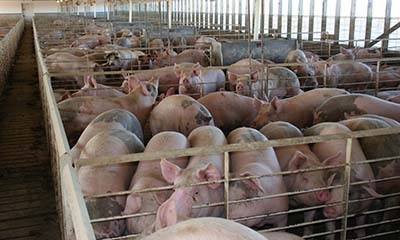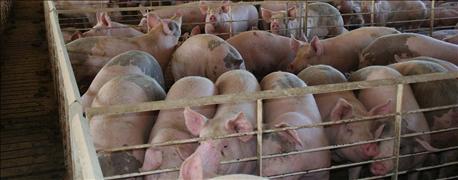
Agriculture secretary Tom Vilsack and American Farm Bureau Federation president Zippy Duvall held a joint conference call Feb. 23 to discuss the benefits of the Trans-Pacific Partnership agreement.
The conference call coincided with the Farm Bureau’s release of an economic analysis of the TPP.
Passage of the TPP will result in $5.3 billion in increased export activity, which will boost annual net farm income by $4.4 billion, Duvall said.
Every billion of agricultural sales helps to support 6,500 jobs, Vilsack said. So in addition to the $4.4 billion increase in net farm income, the TPP will help support more than 30,000 quality, high-paying jobs, he said.

The AFBF economic analysis forecasts U.S. pork exports will be $940 million higher. (Photo: Darcy Maulsby/Thinkstock)
The Trans-Pacific Partnership is a multi-nation trade agreement between the United States and 11 other countries. The agreement was reached in October 2015 and it must be ratified in all the countries taking part in the agreement before it takes effect. It is unknown when Congress will take up the issue.
Duvall said the TPP is a plus for all commodities.
“TPP will mean a boat-load of expanded exports and increased demand for America’s agricultural products,” he said. “Clearly, America’s farmers and ranchers have much to gain from approval of TPP and we support its ratification. American agriculture is a growth industry, and to continue that trend, we must expand our market opportunities.”
Among the key findings of the AFBF analysis:
-Livestock receipts with implementation are $5.8 billion higher with approval. For crops, including fruits and vegetables, receipts are $2.7 billion higher.
-U.S. beef and pork exports are expected to be $1 billion and $940 million higher, respectively.
-Net trade rises for rice, cotton, beef, pork, poultry, butter, cheese and non-fat dry milk.
-Net trade of corn declines slightly, but overall use increases as livestock and poultry are fed in the U.S. and exported.
-Farm prices for corn, soybeans, wheat, rice, cotton, fed steers, feeder steers, barrows and gilts, wholesale poultry and milk are projected to be marginally higher with the agreement in place.
The National Cattlemen’s Beef Association is calling for quick passage of the TPP.
“Asia and the Pacific Rim are extremely valuable markets for U.S. beef,” said Tracy Brunner, NCBA president, in a media statement. “We not only export steaks and ground beef, but this region demands high quality variety meats like beef tongue. Those products bring a premium in these markets and add value back to producers here at home. Trade is an investment in our future, profitability for the next generation.”
The National Farmers Union, however, is urging caution.
"The year-after-year growth of the U.S. trade deficity is an alarming trend for an already stressed agriculture economy," said NFU president Roger Johnson. "To broadly categorize agriculture as benefitting from this agreement is not giving due diligence to the serious concerns that are not addressed by TPP."
Those concerns include currency manipulation and predatory trade practices.
"I continue to urge Congress to give thoughtful consideration to opposing the TPP,” Johnson said.
About the Author(s)
You May Also Like




